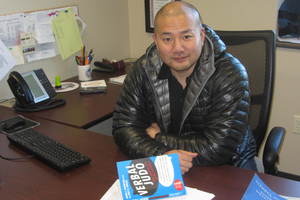Justice Studies faculty member trains in verbal judo

CHADRON – The increased scrutiny of police in the wake of highly publicized incidents of private citizens killed during encounters with law enforcement has made Chadron State College justice studies professor Jamie Wada highly conscious of the importance of teaching his students how to use words to defuse conflict situations.
Now, thanks to a session at the Denver Police Academy last August, Wada has under his belt the basic skills of verbal judo, a well-known tactical communications system that combines the insights of martial arts with the use of language to gain cooperation from people under stressful conditions.
“Right now the big thing with police is how to communicate and deescalate problems and gain voluntary compliance,” said Wada, who received the Nebraska State College System 2015 Teaching Excellence Award.
Dr. George Thompson, a professor of rhetoric in Kansas, created the verbal judo training program in the 1980s. A five year stint in law enforcement taught Thompson “police officers can defuse situations with their words,” but oftentimes couldn’t explain how they had done it, said Wada.
Using his academic background in language and insights from his own martial arts training, Thompson analyzed the officers’ techniques, Wada said, to create a program widely used by police departments and other organizations.
“They have trained over a million people,” he said.
Thompson’s program begins with five basic principles, according to Wada. Condensed, they are: 1. All people want respect and to be treated with dignity; 2. All people want to be asked, rather than told; 3. All people want to know why they are being asked to do something; 4 All people would rather have options than threats; 5. All people want a second chance.
“If we apply those rules to talking to someone who is not compliant, we can get compliance,” Wada said. “When people are uncooperative and they are angry, (verbal judo) is deflecting what they say and redirecting it back to a professional conversation.”
In practice, that means responding to someone who is angry and perhaps verbally abusive with phrases like ‘I understand, I hear you, I get it but…’ Wada said. “After the ‘but’ you go back to the professional conversation,” he said.
Verbal judo also emphasizes the importance of other aspects of the police/citizen interaction, such as stance and tone of voice, noted Wada, because angry, upset people often don’t listen clearly to an officer’s words.
“Tone is everything. It’s how you say it,” he said. “Most things are (spoken) in an asking manner.”
Verbal judo techniques are effective in part because “you are really just trying to get people to think logically about what’s going on,” Wada said.
The techniques are also applicable in many areas besides law enforcement.
“They are doing a lot of training in hospitals now, and they do corporate stuff,” he said. “I think it fits in any realm.”
Wada has already been teaching his students, some of whom are considering careers in police work, about the use of language in law enforcement. He has training in the use of linguistic analysis to tell if someone is lying, and can analyze a written narrative to determine the likelihood that it is truthful.
That will be part of a First Year Inquiry course called ‘Liar, Liar,’ that he is teaching this fall.
“I’m mostly going to talk about deception in the written word,” he said. “It’s like code breaking. It’s really cool stuff.”
Interrogation techniques and verbal judo will be part of the course too, and Wada said verbal judo will be useful for students in his introduction to law enforcement and organizational management classes as well.
“Communication is going to be key for law enforcement,” he said.
Learning verbal judo was part of police training courses, said Wada, who has attended a coroner school and courses in interrogation, crime scene photography and linguistic analysis, among others.
“I always try to do one or two trainings a year that I can bring back here. Something that will be practical for (students),” he said.
And law enforcement training is particularly valuable right now, according to Wada.
“If you want to be a law enforcement officer, now is a good time,” he said. “All the police departments I’m aware of are having a hard time getting qualified candidates.”
Category: Campus News, Employee Awards & Achievements, Justice Studies
